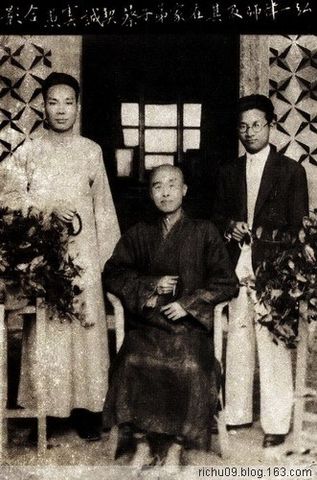Views
m |
|||
| Line 2: | Line 2: | ||
== Yú Déyuán 虞德元 (1909-1989) == | == Yú Déyuán 虞德元 (1909-1989) == | ||
| - | ''Pictured here | + | ''Pictured here at right, next to Master Hóngyì [[弘一]]'' |
Revision as of 06:05, 13 May 2009
Yú Déyuán 虞德元 (1909-1989)
Pictured here at right, next to Master Hóngyì 弘一
- Born August 15, 1909 (6/30 Xuāntǒng 宣統 1) in Xiàmén 廈門, Fújiàn 福建
- Died July 28, 1989 in Xiàmén 廈門, Fújiàn 福建
- Also known as Yú Yú 虞愚.
Biography
Born August 15, 1909 in Xiamen. As a youth he read the works of Zhāng Tàiyán 章太炎 and Liáng Qǐchāo 梁啓超 and was inspired to study Buddhism. He was enrolled in the second class at the Wuchang Buddhist Seminary 武昌佛學院, which started on September 1, 1924. In February 1925, Tàixū 太虛 lectured on the Èr shí sòng jīng 二十頌經, which inspired Yú to study Consciousness-Only and Buddhist logic. In October 1926 the National Liberation Army took over the school and used it as a barracks. Yú went to Shanghai and went to college. After he graduated he returned to Wuchang.
In 1930, Yú tested into the Psychology Department at Xiamen University. His college was next to Nán pǔtuó 南普陀 Temple, which housed the Minnan Buddhist Seminary 閩南佛學院. Until he graduated in 1934, Yú would go to the Seminary to attend lectures, some of which were taught by professors from his university. He was the prime recorder for Tàixū’s Fǎxiāng wéishì gài lùn 法相唯識學概論, which is a collection of lectures Tàixū gave at the Seminary.
After graduating, Yú stayed and taught at Xiamen University until 1935, when he went to participate in the Republican government in Nanjing. When the government moved to Sichuan in 1937, Yú quit and went back to Xiamen. During this time he got to know Hóngyì 弘一. At some point during the the War, he fled to Hong Kong, then Hankou, then Chongqing, and finally Sichuan where he taught philosophy at the Sino-Tibetan Institute 漢藏教理院. He published two more books in 1939 and 1940 on logic (Chinese, then Indian). In 1941 he took a teaching job at Guizhou University, where he taught for two years. In 1943, he became assistant professor of philosophy at Xiamen University, and after the war ended in 1946 he became a full professor.
In 1956, Yú took a job teaching at the Chinese Buddhist Seminary 中國佛學院 in Beijing. After the end of the Cultural Revolution in 1979, he became a researcher at the Academy of Social Sciences in Beijing, becoming a specialist researcher in philosopher there in 1982. He returned to Xiamen in 1987 due to illness, and he died there on July 28.
Major Works:
Yīnmíng xué 因明學 (Buddhist Logic). 1936.
References:
Yú Língbō 于凌波. Zhōnguó jìnxiàndài fójiào rénwù zhì 中國近現代佛教人物志 (Biographical Almanac of Early Contemporary and Modern Chinese Buddhism). (Beijing: Zongjiao wenhua, 1995), 638-642.
